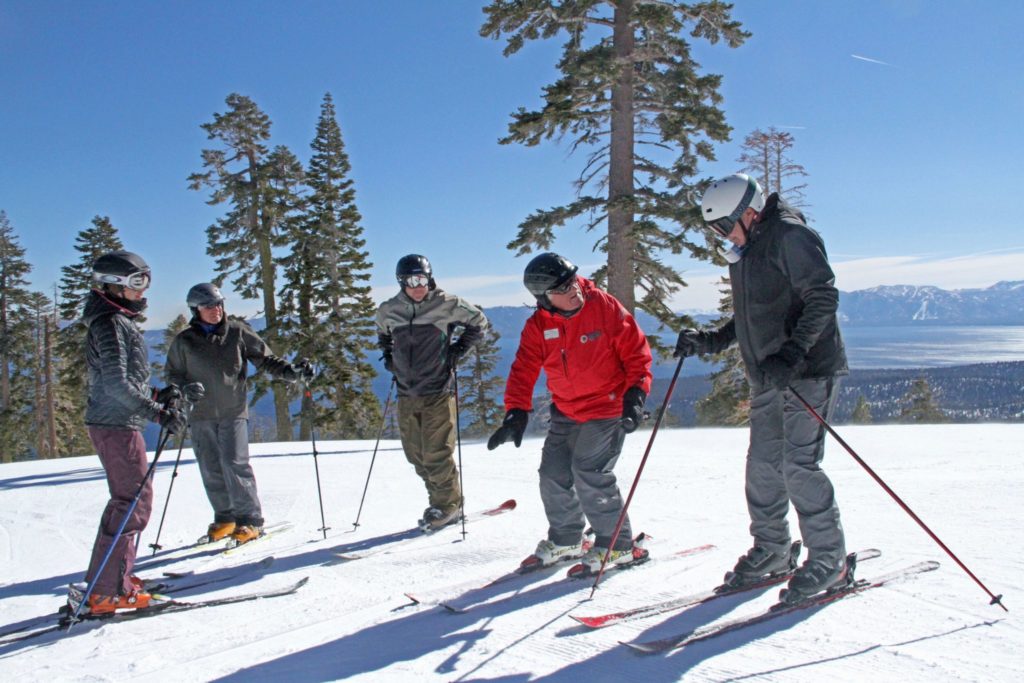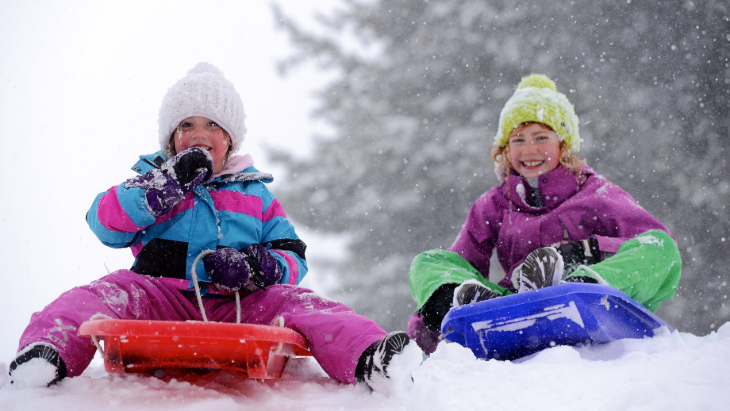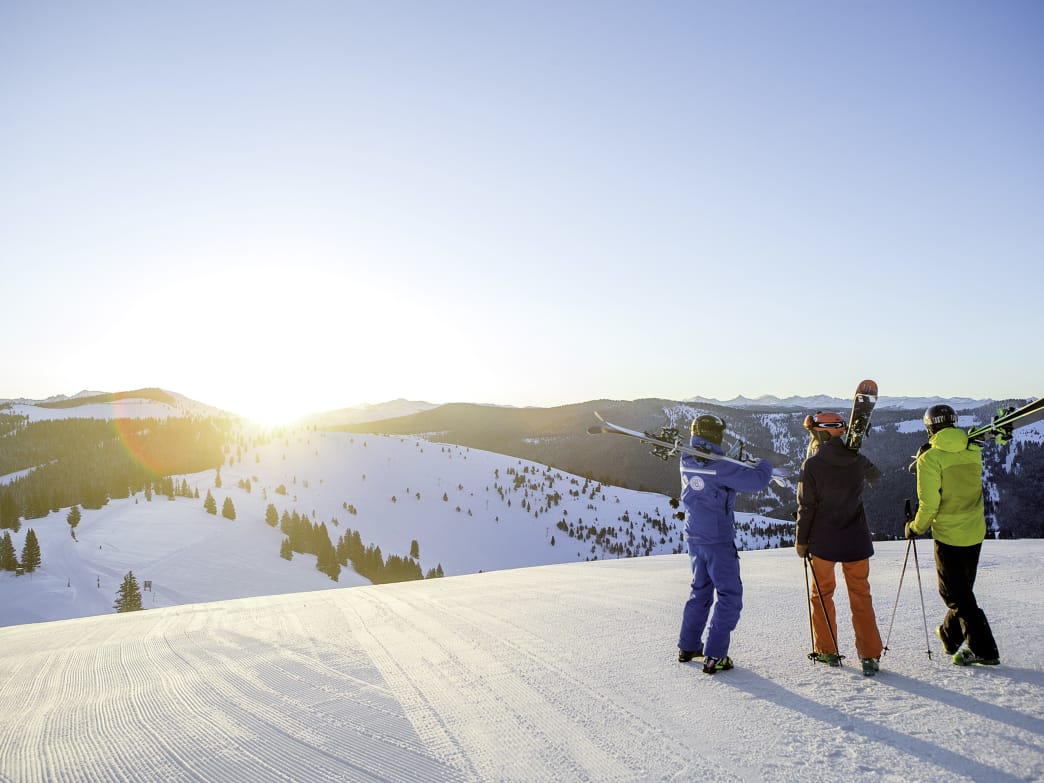
The ski weight refers to the combined weight of a pair skis and bindings. It affects how well the ski performs and whether it's suitable for your needs. It also impacts your ability ski in different snow conditions.
Ski Width
The ski's width can affect how easy it turns and handles different snow conditions. A narrower waist width will allow for faster edge-to-edge turns in powdered and un-grommed snow. However, a wider waist width will provide better flotation in soft, well-drained snow.
Touring Ski Length
A touring ski's length affects how quickly it initiates and sustains turns, especially at high speeds. It is generally easier to turn longer skis than shorter ones. However, this all depends on the conditions and the skier’s ability.
Track Setter Dimensions
The cross country ski track settingter dimensions will determine the ease with which your boots can be released from the binding in an event of an accident. The higher the setting for the din, the harder it is to free your boot from its binding. This protects your knees and ankles.

Bindings can be attached on many ski types. The most common type is track-mounted, which attaches directly to the base of a ski. Advanced skiers also have the option of drilling-mounted bindings. These bindings can be fixed by a drilling/gluing process.
All-mountain and all-telemark skis have track-mounted boundings. These bindings are simple to use. Similarly, drill-mounted bindings are preferred by more advanced skiers because of their added security and stability.
Boots Are a Crucial Part of Your Equipment
Ski boots can be classified by their flex rating, which is an indication of how flexible they are. These boots can offer more leverage and support, but they can also make it difficult to ski at high speeds or on rough terrain.
They are perfect for beginners and people who wish to spend less time in the snow. They reduce the strain on your Achilles tendon as well as the muscles in your lower legs.
Boots are important to protect your ankles and foot from injury in case of an accident. They are useful for supporting your foot and ankle while skiing and also to keep you from sliding down the slopes.

How do I measure my skis?
Traditionally, skis had been measured by the length of their legs. Manufacturers today use camber measurements to measure ski length. This allows you to more accurately determine your ski size.
What length is best for me?
Beginners should start with a short length. This allows you to make turns faster and helps you gain speed quicker. If you're a intermediate or advanced skier, consider a longer length to add stability and increase float in softer snow.
Are Long Skis Required?
Skis that are longer can be slower to ski, but offer more stability and stability under different snow conditions. The ideal length of your skis should be appropriate for your height, ability level and preferences. Talk to your local sporting retailer if you are unsure of your ideal length. They'll be able to help you select the right skis for your abilities and preferences.
FAQ
What documents should I have with me while traveling?
Keep copies of important documents at home for easy access while on the road. You may also want to consider keeping copies of your passport, driver's license, and other official identification cards and any credit card information you might need if you plan to use an ATM machine.
A photocopy of your passport is always a good idea so that it can be used to prove identity in case of emergency.
Do not forget to include copies and reservation confirmations. These will help keep you organized and allow you to plan your trip.
As well as this, you should keep a copy of your flight ticket and hotel reservation details. This way, you'll be able to contact someone back home if you get into trouble.
Finally, it's always a good idea not to leave anything valuable unattended. It's a good idea to keep valuables safe and secure by storing them inside your luggage or on a money belt.
Check your bag before you go to prevent losing expensive items.
Remember that it is always safer to be simple than to plan everything.
So just relax and enjoy your journey!
What should I put in my luggage?
Always have at least two pairs. You should have at least two pairs of shoes for your daily walks in the city, and one pair to take on vacation.
Make sure you have enough clothes to cover both. For plane travel, make sure to bring extra socks, underwear, shirt, and pants.
It's a good idea to bring along some clothes for longer stays. This will make it easier to go shopping for new outfits and won't make you feel uncomfortable.
Comfortable shoes should be worn if you are taking the bus or train. For those who drive, it is a good idea to have spare tires.
It is important to have plenty of toiletries like shampoo, toothpaste and moisturizer.
Last but not least, make sure you have a flashlight, an insect repellent, sunscreen and sunglasses as well as a first aid kit.
Do not forget to pack all your essentials in one bag. This will save you time and space.
Last but not least, make sure to bring a small towel & washcloth. These will come in handy after a long day sightseeing.
How do you travel light?
There is no right or wrong way to pack for a trip. Here are some tips to help you decide what to pack.
-
Only take what you actually need.
-
Pack only what you'll actually wear.
-
Don't buy too many.
-
Make sure you have room in your suitcase.
-
Double-check everything that you have packed.
-
Take advantage of free storage facilities.
-
Reusable water bottles are better than bottled water.
-
Carry a backpack instead of using a suitcase.
-
When possible, walk or cycle instead of taking public transport.
-
You can choose the right size bag.
-
Avoid carrying heavy objects.
-
Prepare for anything.
-
Nothing should be left behind
What cheap accommodations are available when traveling abroad?
For travelers looking for cheap accommodation, there are several options: hostels; hotels; guest houses; and bed & Breakfasts.
Hostels are affordable and provide dorm-style rooms in which guests share bathrooms and living spaces.
Hotels are usually located in touristy areas and provide private rooms with en suite bathroom facilities.
Hostels have similar features to guesthouses, but they are more spacious and can accommodate fewer guests.
These bed & breakfasts are very popular with budget-conscious travellers. Guests stay in private homes and enjoy a full breakfast included in the price of their stay.
Here are some things you should never forget about when traveling.
You will find yourself in situations that leave you with very little time for making decisions when you travel. Be ready to adapt.
You could be stuck there for hours, days and even weeks. If you have a plan, you'll be able to provide food, water, shelter and a place to rest. You may need to improvise if you don't plan ahead.
In these cases you will need to rely on your best skills. It means you have to be able to quickly make decisions based upon your experience and instinct.
But sometimes, you won't have any choice. For example, you could be stranded in an area without cell phone service, running out of gas, or having been robbed. In these cases, you will have to adapt quickly and respond to any situation.
The key is to keep calm, stay focused and act decisively. Don't panic. Instead, stay focused on what you have control of.
If you are lost in the woods, it is possible to choose which direction you should go. If you are hungry, you can eat mushrooms or berries. Rainwater can be drank or snowmelt.
Or if you're tired, you can rest. You can layer up if you are cold. You can also change your clothes if you are wet. No matter what you do, it will make you feel better to stay positive.
What amount of luggage should I bring?
The length and type of trip will dictate how much luggage to take. For a flight, hand baggage is not necessary, typically less than 20 kg. However, if you are taking a train or bus, then you will need more space.
An airport form with information regarding your flight will be handed to you upon arrival. This form will contain information about your flight, such as the weight and assistance required when you check them in.
Before you leave for work, make sure to check it. You could end up spending hours waiting for your luggage to be checked while others check theirs.
It's best to travel light, as you never know when something might happen. For example, if your bag gets lost, you won't have anything to wear.
Do you ever worry that you might forget something when you travel?
Yes, I often forget stuff. This is most common on short trips. Fortunately, I always have everything, so I never run short of things.
For instance, I always carry my passport with me. And I always check whether I have enough money when I buy tickets.
Also, my phone charger is always with I. A small bag is also handy for storing other items.
Statistics
- Case in point: the private island of Ilha Caldeira, less than seven miles off the coast as part of the Primeiras and Segundas Archipelago, is located within the marine-protected area with 20 percent of the country's intact living coral. (travelandleisure.com)
- You can use compression sacs or cubes to reduce the volume of your clothes by up to 80%—this is especially convenient for bulky items such as sweaters and jackets. (eaglecreek.com)
- According to Maori legends, this park holds 14 fjords that were all carved by a giant stonemason with an adze. (busytourist.com)
- They're also likely to offer babysitting services, in case you'd like to have dinner one night after 7 p.m. (travelandleisure.com)
- No Checked Bags: No Alcoholic beverages with more than 70% alcohol (over 140 proof), including grain alcohol and 151 proof rum. (tsa.gov)
External Links
How To
What are the best travel tips for beginners?
Although traveling can be an exciting experience, there are many things you need to avoid to ensure a safe trip.
Here are some simple tips to help you plan your next holiday.
-
Make sure to book early. The lower the price, the earlier you book. Avoid last-minute offers by airlines and hotels to save money.
-
Stay-at-budget accommodations. Cheap hotels offer better value for money. They are typically located near shopping centers and public transportation.
-
Don't overpack. Pack light. You can leave room for souvenirs or gifts. Take clothes that fit well.
-
Use common sense. If you're traveling alone, don't walk around late at night. Avoid areas with high crime and insecure neighborhoods.
-
Make sure you take preventative measures against theft. Keep valuables hidden from view. You should never leave anything valuable at home when you go swimming.
-
Take care with your cash. Thieves often target tourists visiting foreign cities. Keep your money out of view and use ATMs inside banks or guarded facilities.
-
You need to know what you are doing. Prior to booking a room in a hotel, make sure you understand how public transport works. Discover information about tourist attractions and restaurants.
-
Safety is important. Before you go, find out about the local laws, customs and culture.
-
Have fun. Enjoy the ride, no matter what. It is worth it.